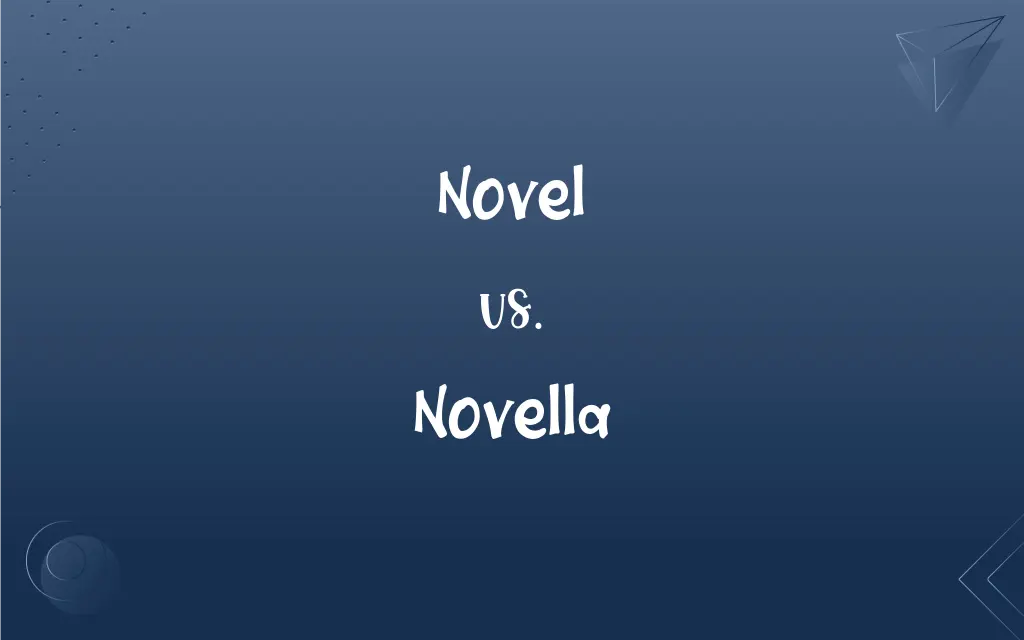Novel vs. Novella: What's the Difference?
Edited by Aimie Carlson || By Harlon Moss || Updated on October 12, 2023
A novel is a lengthy, fictional narrative, while a novella is a shorter, more succinct fictional work. Both offer varied, developed storylines.

Key Differences
The literary world graciously houses varied forms, with the novel and novella being prominent yet distinct entities. A novel, in its quintessential form, is a comprehensive, fictional prose that delves into complex narratives, evolving characters, and multifaceted plots. In contrast, a novella provides a more concise and focused narrative, offering shorter, often more direct explorations of its themes and characters, bridging the length gap between a short story and a novel.
Diving into structural nuances, novels often facilitate deeper explorations into plot developments, character arcs, and thematic depth, providing a vast canvas to paint intricate and layered stories. Novellas, on the other hand, lean towards brevity, enabling a sharper focus on specific narratives or characters without traversing into the extensive depths that novels often do. The length, thus, distinctly demarcates a novel from a novella, though both can explore a myriad of thematic concerns and narratives.
From a reader's perspective, novels invite them to embark on lengthier journeys, immersing them into a detailed universe that unfolds gradually, offering profound insights into its characters and plots. Novellas, conversely, offer quicker, more immediate gratification, succinctly unraveling stories and often leaving readers in contemplative spaces, owing to their brevity and often open-ended narratives. Both forms cater to diverse reading appetites, offering alternate durations and depths of literary engagement.
In terms of storytelling, novels offer a broader scope for writers to weave intricate plots, subplots, and develop characters, thereby building a comprehensive narrative tapestry. Novellas might underscore a particular incident, relationship, or theme, maintaining a more streamlined narrative trajectory, succinctly exploring its focal point without meandering into expansive plot territories. Both novel and novella hence become tools for varied narrative explorations, chosen as per the breadth and depth desired for the story.
In the realms of thematic exploration, novels afford the luxury of exploring numerous themes, ideologies, and arcs, intertwining them through its extensive narrative. The novella, with its condensed format, might opt for a more focal thematic exploration, often dissecting a singular theme or notion with depth and brevity. Thus, both novel and novella, while providing narrative escapes, offer different scopes and depths of thematic voyages, catering to diverse narrative and reader needs.
ADVERTISEMENT
Comparison Chart
Plot Complexity
Usually features complex, multi-threaded plots.
Typically has a more straightforward, focused plot.
Character Development
Allows for thorough character development.
May have limited character development.
Thematic Exploration
Can explore multiple themes and subplots.
Often zeroes in on a specific theme or incident.
Reader Engagement
Demands longer, immersive reader engagement.
Allows for quicker, often intense reader engagement.
Novel and Novella Definitions
Novel
A novel entails a long, often complex fictional narrative.
Her debut novel, sprawling over 600 pages, offered a riveting, comprehensive tale.
ADVERTISEMENT
Novella
A novella offers a concise, often focused story.
His novella, centered around a single mysterious event, captivated readers.
Novel
A novel allows for a deep, thorough exploration of its contents.
The novel took readers on a profound journey through historical and emotional landscapes.
Novella
A novella typically explores a singular, centralized theme or event.
The novella delved into the complexities of unrequited love with raw emotion.
Novel
A novel can explore numerous themes and subplots.
His novel intertwined love, loss, and redemption in a complex narrative tapestry.
Novella
A novella, in its compactness, often tells a complete story with brevity.
The novella, with its concise narrative, offered a quick yet immersive read.
Novel
A novel provides a wide, detailed exploration of stories.
Her novel spanned across generations, exploring intricate family dynamics.
Novella
A novella might deeply explore a character or relationship in its brevity.
Her novella crafted an intense study of its protagonist's internal struggle.
Novel
A novel typically features a plethora of character arcs.
The novel intricately weaved the lives of its diverse, multifaceted characters.
Novella
A novella provides a shorter, succinct piece of fiction.
The novella skillfully depicted a poignant tale within its limited pages.
Novel
A fictional prose narrative of considerable length, typically having a plot that is unfolded by the actions, speech, and thoughts of the characters.
Novella
A short prose tale often characterized by moral teaching or satire.
Novel
The literary genre represented by novels.
Novella
A short novel.
Novella
A short novel or long short story.
Novella
(historical) novel
Novella
A short novel
FAQs
Can a novel explore multiple primary themes?
Yes, novels often intertwine multiple themes and subplots.
Does a novella have chapters like a novel?
Yes, but typically fewer due to its shorter length.
How long is a standard novel?
Often 40,000 words and above, with variability in genres.
What differentiates a novel from a novella?
Primarily length, but also often complexity and depth of narrative and character development.
Is a novella a quick read compared to a novel?
Generally yes, due to its significantly shorter length.
Can a novella be written in different narrative styles?
Yes, novellas may employ various narrative perspectives.
Are novellas commonly adapted into movies?
Yes, many novellas are adapted into films, often with added content.
Can a novel span across various time periods?
Yes, novels often traverse various eras or time periods.
What’s the primary narrative style for novels?
Novels can utilize various styles: first-person, third-person, or even a mixed narrative.
Do novels always resolve their main conflict?
Mostly, but some novels intentionally leave conflicts unresolved.
Is the character development in a novella often limited?
Typically yes, due to the constrained length.
Can a novella explore profound themes?
Absolutely, despite their brevity, novellas can delve deeply into themes.
Can a novel focus on a single character?
Yes, novels can center around one character or many.
Is the popularity of novels and novellas cultural or universal?
Both forms are universally recognized, but their popularity can vary culturally.
Can a novella be converted into a novel?
Yes, by expanding on plot points, characters, or themes.
Is a novella considered a short story?
No, it's longer than a short story but shorter than a novel.
Are novellas popular in specific genres?
Novellas are found across genres but are notably popular in science fiction and romance.
Are first-time authors advised to write novels or novellas?
Either is valid, though novellas might be less daunting due to their length.
Are subplots common in novels?
Yes, novels often explore multiple, interwoven subplots.
Can novels be part of a series?
Yes, novels can stand alone or be part of a series.
About Author
Written by
Harlon MossHarlon is a seasoned quality moderator and accomplished content writer for Difference Wiki. An alumnus of the prestigious University of California, he earned his degree in Computer Science. Leveraging his academic background, Harlon brings a meticulous and informed perspective to his work, ensuring content accuracy and excellence.
Edited by
Aimie CarlsonAimie Carlson, holding a master's degree in English literature, is a fervent English language enthusiast. She lends her writing talents to Difference Wiki, a prominent website that specializes in comparisons, offering readers insightful analyses that both captivate and inform.







































































